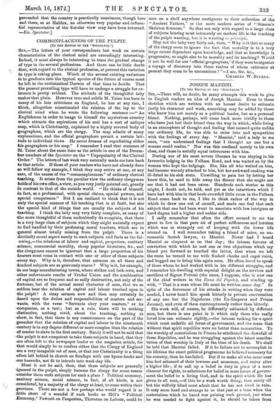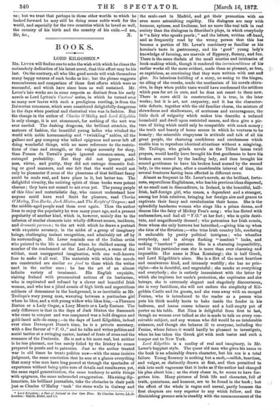JOSEPH MA Z Z 'NI.
[To THE EDITOR OF THE "SPECTATOR."] S1R,—There will, no doubt, be many attempts this week to give to English readers an idea of Joseph Mazziai. Even to those sketches which are written with an honest desire to estimate justly his character and work, something may be added by those who knew him not merely as a political leader, but as a personal friend. Nothing, perhaps, will come back more vividly to those who have just lost their friend than the way in which, while living in an atmosphere of thought and feeling that seemed quite unlike our ordinary life, he was able to enter into and sympathize with the feelings of every day. " Mazzini," said a lady to me once, " can understand feelings that I thought no one but a woman could realize." Nor was this confined merely to his own class, and those in socially equal intercourse with him.
During one of his most severe illnesses he was staying in his favourite lodging in the Fulham Road, and was waited on by the woman who kept the lodgings. She, like all who waited on him, had become warmly attached to him, but her awkward cooking was ill-fitted to his sick state. Unwilling to pain her by letting her know this, he used to hide away the dinner that she might not see that it had not been eaten. Hundreds such stories as this might, I doubt not, be told, and yet as the interviews which I have had with him in that book-crowded little room in the Fulham Road come back to me, I like to think rather of the way in which he drew one out of oneself, and made one feel that each subject that one had been wont to associate with low intrigues or hard dogma had a higher and nobler side.
I sadly remember that often the effort seemed to me too great to live in that pure air of perfect selflessness and heroism which was so strangely out of keeping with the lower life around us. I well remember taking a friend of mine, an un- romantic Scotch lawyer, to Mazzini. Never had I heard Mazzini so eloquent as on that day ; the intense fervour of conviction with which he met one or two objections which my friend put forward so touched the latter, that when we left the room he turned to me with flushed cheeks and eager voice, and begged me to bring him again soon. He often loved to speak of those whom he had worked with in his different struggles, and I remember his dwelling with especial delight on the services and sacrifices of Signor Petroni (the same, I suppose, who is now one of the chief writers in the Roma del Popolo), and winding up with, " That is a man whose life must be written some day." In spite of the fierceness of his attacks in writing when they were needed, I never heard him speak bitterly in private conversation of any one but the Napoleons (the Ex-Emperor and Prince Jerome), and even of them contemptuously rather than bitterly.
His work will, of course, be differently estimated by different men, but there is one point in it which only those who really loved him can estimate rightly,—the intense seeking for a spirit which must underlie all forms of government, and the sense that without that spirit republics were no better than monarchies. To the worship of materialism in France he attributed the downfall of these Republics, and he was struggling against the latest manifes- tation of that worship in Italy at the time of his death. We shall be told that Mazzini failed. If it be failure not to accomplish in his lifetime the exact political programme he believed necessary for his country, then he has failed. But if to make all who came near him feel ashamed of their lowness and meanness, and strive after
a higher life ; if to call up a belief in duty in place of a mere clamour for rights, to substitute for belief in mere forms of govern- ment the belief in a living God, and in the spirit which He has given to all men,—if this be a work worth doing, then surely all but the wilfully blind must admit that he has not lived in vain. It may seem hard and strange to us that just at a time when the materialism which he hated was gaining such ground, just when he was needed to fight against it, he should be taken from
us ; but we trust that perhaps in those other worlds to which he looked forward he may still be doing some noble work for the world, and especially for the two countries which he loved so well, the country of his birth and the country of his exile.—I am,



































 Previous page
Previous page